By Emily Stephenson
WASHINGTON (Reuters) - U.S. Senator Bernie Sanders, an independent from Vermont, launched a long-shot bid for the 2016 Democratic presidential nomination on Thursday, a move likely to pressure Hillary Clinton from the left on issues from income inequality to corporate governance.
Sanders, one of the most outspoken liberals in Congress, called for rebuilding the middle class and reducing the influence of wealthy Americans and businesses on U.S. elections.
"This country today, in my view, has more serious crises than at any time since the Great Depression," Sanders said at a news conference outside the U.S. Capitol. "How do we create an economy that works for all of our people, rather than a small number of billionaires?"
The 73-year-old, second-term senator faces long odds against the fund-raising might and name recognition of Clinton - the Democratic front-runner and former U.S. secretary of state, senator and first lady - to head the Democratic presidential slate in the November 2016 election.
Sanders highlighted his fight against authorizing the Iraq war, which Clinton voted for as a senator, and his opposition to trade deals that liberals and labor unions fear could hurt American workers.
Clinton has not expressed her position but said trade deals should help workers and protect U.S. security.
Clinton said on Twitter (NYSE:TWTR) that she welcomed Sanders to the race.
"I agree with Bernie. Focus must be on helping America's middle class," she wrote, saying Republicans would harm that group.
Sanders, a former Burlington, Vermont, mayor and former member of the U.S. House of Representatives, said he would campaign as an "independent Democrat," saying a third-party candidacy would be too expensive.
As an independent, Sanders belongs to neither the predominant Democratic or Republican parties. However, like fellow independent Senator Angus King of Maine, he attends Democratic strategy meetings in Congress.
He has cultivated a liberal following for defending expanding Social Security and raising taxes on the wealthy.
The Brooklyn native calls himself a "democratic socialist," and says voters know that is different from foreign leaders who call themselves socialists.
His entry could nudge Clinton to take more liberal positions. It could also give her cover against complaints that she will coast to the nomination untested.
Some could see Sanders as a substitute for U.S. Senator Elizabeth Warren of Massachusetts, a darling of the left who has said she is not running. Erica Sagrans of Ready for Warren said in a statement the group was "excited" Sanders is running but wants Warren to jump in.
Similar pressure comes from former Maryland Governor Martin O'Malley, who has not entered the race but has staked out liberal positions on issues such as trade.

Sanders' run is in line with a long Democratic tradition of insurgent liberal candidates challenging more mainstream hopefuls for the party presidential nomination.